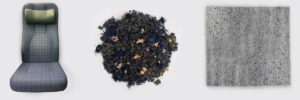The demand for a sustainable industry is increasing, pushing companies towards circularity. Many companies will not be able to cope with that transition. But other Swedish companies have a circular business model as their core. Some of these circular innovators are located in the southeast of Sweden.
Two such companies, Artex and Hasopor, are firm believers in recycling materials instead of throwing them away.
Recycling & upcycling

Images from the Artex process.
The company Artex is located in Mjölby, a small town with just 14,000 residents. Artex designs, redesigns, manufactures, refurbishes and upgrades seats, covers and other interior components for trains, buses, ships and aeroplanes. When others replace seats with entirely new ones, Artex refurbishes and upgrades the seat’s foam, fabric, plastic and metal components, extending the life of the interiors of vehicles by 15-20 years. Artex’s circular offer provides business and environmental value to the train operator. It is expected that total refurbishing with Artex saves 900 tonnes of CO2eq every year, based on current production.
Refurbishing the interior in mass transportation vehicles is one of many ways to reduce emissions; there is also significant potential in reusing old textiles and foam from seats into new products. By teaming up with different circular initiatives, like TexChain3 and , Artex keeps looking for new ways of using the waste generated from the refurbishment as a circular solution. An early investigation shows that by finding a use for their waste, they can save an additional 200 tonnes of CO2eq every year, given the existing volume of the textile side stream.
Giving old materials new life
Another company that uses old material is Hasopor, which produces foam glass; a light-weight filling material used in construction. The material provides several benefits when constructing roads, railroads, buildings of all kinds, parks, roundabouts, green roofs, sports facilities and many other applications. The main advantages of foam glass are its strength in combination with low density, and virgin construction materials like sand and gravel can remain in the ground.
Hasopor uses the lowest grade of recycled glass – put on landfill – to innovate and manufacture material that can be utilised in new sustainable applications.
By using this residue, Hasopor helps the construction industry become more sustainable and contributes to the circular economy by manufacturing foam glass in an efficient way with minimal environmental impact. The resulting product is a foam glass 99,8 % circular, according to the C-Metric determined by RISE, Research Institutes of Sweden. No virgin material is used, and the 0,2 percent remaining is an industrially manufactured bi-product ingredient, which is currently not classified as waste.
Recycling potential
The more sustainable choice is easy when comparing the Global Warming Potential (GWP) of different lightweight fill materials. The GWP of Glass Foam is 7,7 kg CO2 eq. per manufactured m3, while the alternative Light Expanded Clay Aggregates (LECAs) and Expanded Polystyrene (Plastics) that has the GWP of 119 kg CO2 eq. and 59 kg CO2 eq. per manufactured m3 respectively.
Hasopor is since 2019 part of the Finnish company Foamit Group OY, which manufactures foam glass in Sweden, Finland and Norway.
Recycling and upcycling of old products have a big potential to reduce the pressure on our earth by reducing the number of new materials and products being produced. These circular innovators are essential in shifting to more sustainable societies.